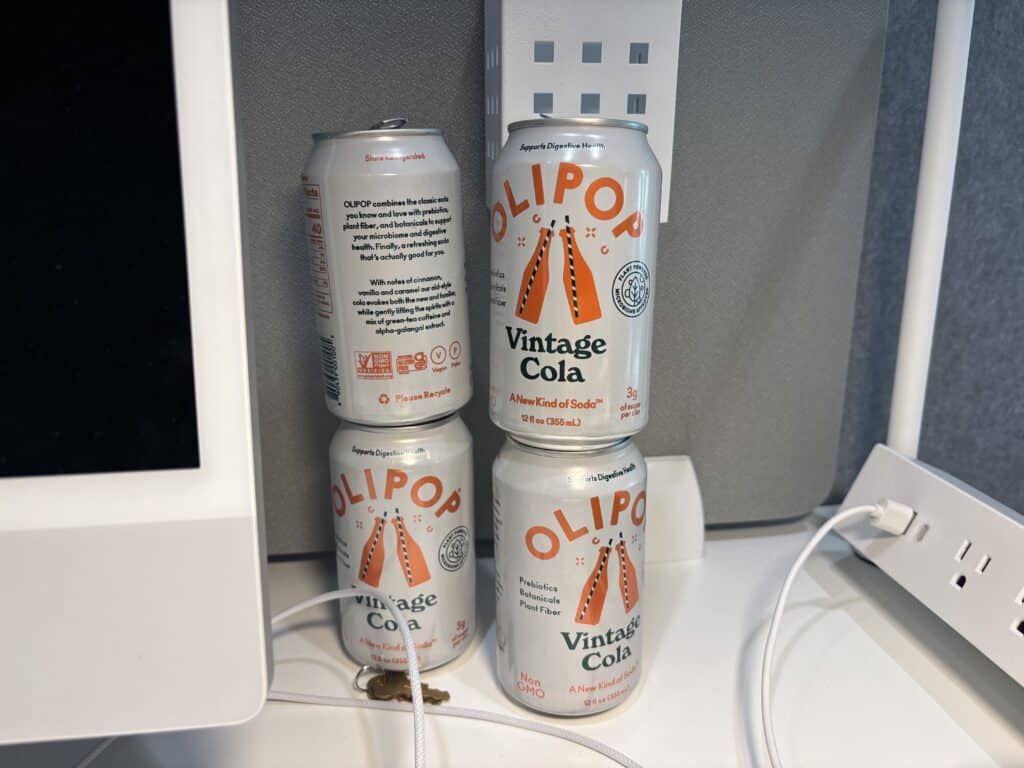Does Olipop Really Support Digestive Health?

Contents
Olipop is beloved by a growing number of adults (including our founder John). From a branding and taste perspective, the product is a triumph, but it’s loved
partly for its taste and partly for its purported health benefits.
Does Olipop really support digestive health? Is it set to rival Coke? Let’s pull the tab.
What is Olipop?
Olipop is a carbonated soda marketed for digestive support and gut health. This beverage is made with:
- 9 grams of prebiotic plant fiber in each can, from:
- Chicory root inulin
- Cassava root
- Jerusalem artichoke inulin
- Botanical extracts:
- Nopal cactus
- Marshmallow root
- Calendula flower
- Kudzu root.
Compared to Coke and other, more traditional sodas, Olipop is much lower in sugar and overall calories. Olipop typically contains just 2-5 grams of sugar per can, versus around 40 g of sugar in a standard soda.
In short, Olipop manages to taste good while being less bad (maybe even good?) for your health.

Get Started With Personalized Nutrition
Gene Food uses a proprietary algorithm to divide people into one of twenty diet types based on genetics. We score for cholesterol and sterol hyperabsorption, MTHFR status, histamine clearance, carbohydrate tolerance, and more. Where do you fit?
Olipop vs. Coca-Cola
In 2024, Olipop recorded record annual sales of around $400 million. Compared to Coca-Cola’s $47.061 billion in annual revenue, this is a drop of soda in the ocean.
How do the two shape up in terms of nutrition, though?
Here’s a comparison of Olipop and Coca-Cola, based on a typical 12-oz (355-ml) can of soda.
| Feature | Olipop | Coca-Cola |
|---|---|---|
| Calories | 30–50 | 138–140 |
| Total sugar | 2–5 g | 39 g |
| Added sugar | 2 g | 39 g |
| Dietary fiber | 9 g (prebiotic) | 0 g |
| Key ingredients | Plant fibers (chicory root, cassava root, Jerusalem artichoke), botanicals, real fruit, stevia | Carbonated water, high fructose corn syrup, caramel color, phosphoric acid, caffeine |
| Prebiotics | Yes (prebiotic fiber) | No |
| Artificial Additives | No (natural flavors only) | Yes |
Does Olipop support digestive health?
The big question is whether the health claims Olipop makes are true.
The short answer is that there is some scientific evidence to support Olipop’s claims about digestive health. However, this evidence mainly relates to prebiotics in general and to increasing fiber intake. And, just as there is evidence to support benefits, research also suggests potential downsides.
As a source of prebiotic fiber, a can of Olipop can feed beneficial microbes in your gut and support a healthy microbiome. This, in turn, supports overall digestive health, in part by promoting production of short-chain fatty acids in the colon.
A healthy microbiome is now well recognized as a key player in a wide range of other bodily processes (such as immune function, mood, cognitive function, etc.), largely attributed to a well-functioning gut-brain axis.
Is there any evidence for Olipop specifically?
No. So far, no published peer-reviewed studies have investigated the impact of Olipop on digestive health or other health parameters.
There is one study that hasn’t been peer-reviewed and was sponsored by Olipop and conducted and written with Olipop’s involvement. This study claims that Olipop’s specific “blend of inulins and resistant dextrins promoted growth of bifidobacteria across gut microbiota from four donors, even those with small initial populations.”
The study also states that the botanicals in Olipop “interacted with fiber fermentation in donor-specific ways, in some cases strongly enhancing fermentation rate and production of short-chain fatty acids.”
Outside of this company study, Olipop sometimes cites a study it co-sponsored at Purdue University that looked at more general effects of dietary fiber. This small study, involving 17 adults aged 20-35 found that when volunteers followed a healthy dietary pattern that included more fiber than they usually consumed, the type and quantities of gut microbial species changed, for the better.
A quick search of PubMed finds only one other study that mentions Olipop, and that’s in a conflict-of-interest statement by one of the researchers. The study itself didn’t involve anyone consuming Olipop for research purposes.
What I’d like to see from Olipop
I don’t have anything against Olipop, and while I haven’t had a chance to drink these sodas myself, they sound great.
That said, if Olipop really wanted to fund a solid research study, it could provide product and sponsorship for independent researchers. Given all the talk from the company’s founders about following the science, I’m surprised this hasn’t happened yet.
I’d suggest a double-blind, placebo-controlled study where participants consume either Olipop or a soda with the same amount of sugar but with no prebiotic fibers or botanicals. Or, even better, a three-armed study with the following interventions in a crossover pattern with washout periods between:
- Olipop
- Soda with same botanicals and sugar levels but no prebiotics
- Soda with same sugar levels but no botanicals or prebiotics.
Now that would give us some data to digest.

Get Started With Personalized Nutrition
Gene Food uses a proprietary algorithm to divide people into one of twenty diet types based on genetics. We score for cholesterol and sterol hyperabsorption, MTHFR status, histamine clearance, carbohydrate tolerance, and more. Where do you fit?
Are there any downsides to Olipop?
Olipop might contain more fiber than some people can handle comfortably. The amount of fiber in each can is pretty significant, especially for the average person who doesn’t consume anywhere near the recommend 30 g or so of fiber daily.
With 9 g of fiber per can, Olipop could cause considerable digestive discomfort to someone unused to that amount of fiber.
This is, in fact, one of the complaints made against rival soda brand, Poppi; that certain prebiotic fibers can cause digestive problems. In Poppi’s case, the prebiotic fiber present in the company’s sodas is inulin, and studies show that even 2.5 g of inulin can cause gas and digestive discomfort, while higher doses (30 g or so) can cause diarrhea for some sensitive people.
The Poppi lawsuit
I mentioned earlier that Poppi was facing a lawsuit about misleading health claims. The company recently settled that class action to the tune of $8.9 million, though it did not admit any wrongdoing.
If you bought Poppi sodas between January 23, 2020, and July 18, 2025, you can file a claim for cash refunds by September 16, 2025 at poppisettlement.com.
Another downside of Olipop is that it’s expensive.
So, in my opinion, if you’re interested in getting more fiber and you already have a costly traditional soda habit, Olipop is definitely worth looking into.
However, if you’re not already drinking sodas, Olipop is a pricy proposition just to add a little fiber to your daily regimen.
Consuming a good chunk of your daily recommended intake of any nutrient from a supplement is typically a band-aid solution at best. When you consume fiber from vegetables, fruits, nuts, seeds, beans, and grains, you also get a wealth of vitamins, minerals, and other nutrients. You don’t get that with isolated inulin mixed with carbonated sugar water, however delicious.
The takeaway
Olipop is unlikely to damage your health, and many people love it, but it’s not really intended as a supplement and carries a major fiber dose that some won’t be able to handle. If you’re not used to a lot of fiber, watch out for some interim gut gurgling as your body adjusts.
For anyone looking to ditch the Cola habit, Olipop is a good alternative that’s much lower in sugar, with the added benefit of a bit more fiber.

Get Started With Personalized Nutrition
Gene Food uses a proprietary algorithm to divide people into one of twenty diet types based on genetics. We score for cholesterol and sterol hyperabsorption, MTHFR status, histamine clearance, carbohydrate tolerance, and more. Where do you fit?



